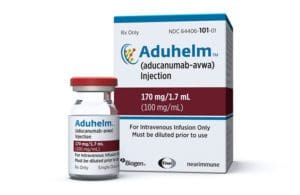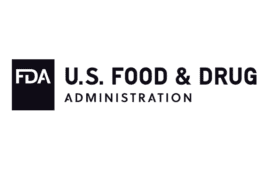 The story of Aduhelm has been rocky now for years. Biogen turned heads when its controversial Alzheimer’s therapy won accelerated approval from the FDA against the advice of its own advisory panel in mid-2021. The company had high hopes for the antibody at that point, pricing it at an average of $56,000 per year. Aduhelm would encounter a series of blows after that – rejected coverage, dismal sales, discontinued trials. Biogen would ultimately pull the plug on the drug this year.
The story of Aduhelm has been rocky now for years. Biogen turned heads when its controversial Alzheimer’s therapy won accelerated approval from the FDA against the advice of its own advisory panel in mid-2021. The company had high hopes for the antibody at that point, pricing it at an average of $56,000 per year. Aduhelm would encounter a series of blows after that – rejected coverage, dismal sales, discontinued trials. Biogen would ultimately pull the plug on the drug this year.
Now, Biogen aims to prioritize other Alzheimer’s programs like the lecanemab, which was jointly developed with Eisai and FDA-approved in July 2023. Biogen noted in a statement that insights gained from Aduhelm hold value for the company. Ultimately, Biogen recorded a $60 million charge tied to wrapping up Aduhelm’s development.
A timeline showing the ups and downs in Aduhelm’s journey in reverse-chronological order follows. Stock data are from Yfinance and annotation chart from Google Charts.
March 21, 2019: Biogen halts two late-stage trials for aducanumab after an independent data monitoring committee concluded that the drug was unlikely to meet its primary endpoint. The company’s stock price fell roughly one-third to $220.26 on March 25, marking its largest dip since February 2005.
October 22, 2019: Biogen announces its plans to seek regulatory approval for aducanumab following a new analysis of a larger dataset appearing to show the drug reduced clinical decline in early Alzheimer’s patients. The company came to the conclusion after revised interpretations of trial data, particularly from the EMERGE trial, which appeared to show efficacy at the highest dose.
November 4, 2020: FDA reviewers appear to endorse aducanumab, indicating a belief in its safety and effectiveness.
November 6, 2020: The FDA’s advisory committee votes against approving aducanumab, citing insufficient evidence from clinical trials to prove its effectiveness in slowing cognitive decline.
May 2021: The final protocol for the ENVISION trial, the Phase 4 post-marketing study of Aduhelm, was submitted to the FDA. Screening of the first patient was expected to begin in this month.
June 7, 2021: The U.S. Food and Drug Administration (FDA) grants accelerated approval for ADUHELM based on its ability to reduce amyloid-beta plaques in Alzheimer’s patients. This approval was controversial due to conflicting trial results and concerns over adverse effects like ARIA-E and headaches. Biogen would later announce that it would price the drug at an average of $56,000 annually, prompting further controversy given its unclear risk-benefit ratio.
June 10-11, 2021: Following the FDA’s controversial approval of Aduhelm, three members of its Peripheral and Central Nervous System Drugs Advisory Committee resigned. They expressed concerns over the approval process and its implications for future drug approvals.
December 20, 2021: In the wake of growing controversy, Biogen announced that it would revise the pricing for Aduhelm, cutting it from an average $56,000 annually to $28,200. The price would be effective January 1, 2022.
January 11, 2022: CMS releases a draft decision proposing to limit Aduhelm coverage to clinical trials. On January 12, 2022, Biogen’s stock skidded more than 7%, falling to $223.77.
March 14, 2022: Biogen amends its collaboration agreement with Eisai. As a result, Biogen obtained sole decision-making and commercialization rights for Aduhelm worldwide, with Eisai transitioning to a royalty-based compensation model.
First Quarter of 2022: Financial implications emerge as a result of the negative CMS proposal, including $275.0 million in charges related to inventory write-off and excess purchase commitments.
April 8, 2022: CMS releases a final National Coverage Determination (NCD) for anti-amyloid treatments in Alzheimer’s disease, including Aduhelm. Aligning with its prior draft decision, its final decision limited Medicare coverage to patients enrolled in approved clinical trials. The agency based the decision on ongoing concerns and debates over the drug’s efficacy, but signaled it could change its mind if new data were available. Not long after, the company announced it would abandon pursing European approval for the drug.
Post-April 2022: Biogen streamlines commercial infrastructure supporting Aduhelm, retaining minimal resources for U.S. patient access programs. In May, a survey revealed that 9 out of 10 neurologists had doubts about the drug. In May, Michel Vounatsos, the company’s former CEO left the company as Aduhelm sales sputtered.
December 31, 2022: Biogen reports additional financial impacts, including $111.0 million in idle capacity charges and roughly $197.0 million related to Eisai’s share of the costs.
Early 2023: Biogen faces increased scrutiny and criticism from the medical community and investors over the continued marketing and distribution of Aduhelm. Fierce Pharma described the drug’s launch as “the worst launch in pharma history.”
Mid-2023: In June 2023, several major healthcare providers and insurance companies announce their decision to not cover Aduhelm. For instance, on June 15, 2023, UnitedHealthcare, the largest private health insurer in the U.S., said it would not cover Aduhelm for its Medicare Advantage or commercial plan members, citing “an absence of evidence for a beneficial clinical effect.” On June 30th, 2023, the Cleveland Clinic health system reached similar conclusions.
December 2023: Biogen releases its Q4 2023 financial report on December 15, which shows a further drop in revenue from Aduhelm. The report also outlines the company’s plans to restructure and cut costs in response to the Aduhelm struggles.
January 31, 2024: Biogen halts commercialization of Aduhelm, ending the ENVISION post-approval study of Aduhelm and returning the licensing rights to Neurimmune.
Filed Under: Neurological Disease



